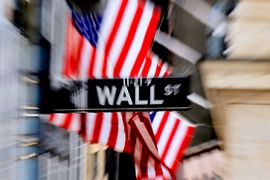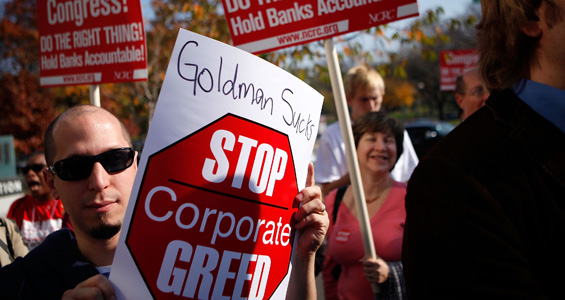Fraud led to the financial crisis?
Media may be ignoring the facts on the sub-prime crisis, says Danny Schechter.

 |
| US media has maintained the line that it was greed and corporate blunders, not fraud, which led to the collapse of the housing market and created the global financial crisis [GALLO/GETTY] |
It is the number one book in the country. Every day, Michael Lewis’s The Big Short is getting bigger, no doubt because he is so media savvy, conversational and likes to laugh with the hosts who interview him about his findings regarding the financial crisis and housing bubble.
On March 14, he laughed with Steve Kroft on 60 Minutes – TV’s top news magazine in the US – when the two bantered on how stupid the financial crisis was and why so many smart people believed the official explanations of the reasons behind the global financial crisis.
The story he tells has no hard edges really; it is about “delusion”, – Wall Street deluding us all and then each other.
The idea of delusions feeds into a psychological and cultural analysis of bankers cut off from the world, focused on their own pocket books and believing their own hype. It is in this sense Shakespearian – the stuff of drama, not calculation.
What a web we weave when first we practise to deceive, to quote Sir Walter Scott.
At one point in the 60 Minutes two-part interview purporting to explain the collapse, Lewis drifts off message and describes it all as an “elegant theft”.
Theft is a word we associate with crime, not personal greed or human failings. But that point was left unexplored by 60 Minutes, of course, because if the story is about crime, than we have to move into the arena of facts, not just opinions, insights, hyperbole and personalities.
Facts, what facts?
Ironically, many of the facts that Lewis himself cites come from an undergraduate college thesis according to the Deal Journal of the Wall Street Journal which calls his book a “yam.”
They note that his book credited “A.K. Barnett-Hart, a Harvard undergraduate who had just written a thesis about the market for sub-prime mortgage-backed [Collateralized debt obligations] CDOs that remains more interesting than any single piece of Wall Street research on the subject.”
Perhaps even more interesting than his book?
Earlier, Lewis explained to the Atlantic news magazine his main sources of information: “Actually, if you were to draw a pie chart of where I get news from, I bet I get a third from whatever people in Berkeley [University] – specifically [what] the parents at my kids’ school – are outraged about. I’m surrounded by people who are alive to what’s going on in the world and who are quick to be outraged by it.”
So there he goes again, with emotion and attitude apparently meaning more to him than fact-finding.
Lewis has criticised those who criticise Goldman Sachs, according to Bloomberg, writing earlier, “bashing Goldman Sachs is simply a game for fools”.
Game for fools
 |
| Schechter says the media needs to focus more on those who lost their homes [AFP] |
On 60 Minutes, Lewis was described as a former trader. Not according to Janet Takakoli who runs her own financial firm:
“Imagine my surprise to see him billed as a trader on 60 Minutes since he was actually a junior salesman,” she writes on Huffington Post. “Well-heeled male peacocks strutted the trading floor, and junior salesmen were girlie-men, mere eunuchs serving their pashas.”
She also notes that he was among the “experts” who downplayed the warnings about the very financial crisis that he has suddenly, thanks to validation from CBS and MSNBC, become the expert to go to for commentary.
“He ridiculed their concern of a pending crisis due to the surge in derivatives demand and called it ‘this year’s case in point’. Then Michael showed how dangerous it is to be a brilliant writer with a poor command of facts and their true meaning,” Takakoli wrote.
Doom and gloom?
The media is not sufficiently equipped to communicate to the public the realities of the financial crisis. As a media dissector and editor of Mediachannel, I have followed the reporting of this story closely with many detailed articles (and in two books since).
Before the housing bubble burst and the financial crisis went global, I made my film In Debt We Trust only to be dismissed by some as a “doom and gloomer” for exposing the sub-prime mortgage fraud.
I was hoping that Rachel Maddow – who hosts her own show on MSNBC – would challenge Lewis’s mass delusion theory but she bought right into it also.
At one point as she interviewed him, Lewis opined that there was deception (lying by the investment world) but that too was not examined as Lewis himself counterpoised two explanations for the disaster, asking, “was it mass delusion or crime?
And then he “answered” his own question or appeared to, by asserting that when you ask the people involved, they say it was delusion.
What does Lewis think they would say? Does he think they would cop to their own criminality? For them, it was all one big miscalculation, never mind who got hurt, which neither 60 Minutes nor Maddow explored.
Money on the crisis
I am also sorry to say that Jon Stewart of The Daily Show did no better with his part of Lewis’s all star media mystery tour.
He did introduce him as one of the people making big money on the crisis but then jokingly let him ramble on, praising the sometimes weird people who made small fortunes betting against Wall Street. They were his heroes.
Again no concern was expressed for the people they cheated – only the idiots who lost money in the” kingdom where the blind man was king.”
Lewis, like many non-fiction novelists, prefers character-based story-telling or “yarns” to more objective analytical investigation. It makes for better narratives, and bigger best sellers.
It also gets the interviewers laughing instead of crying. Why? Well, that is because when it turns out that smart men do things that turn out to be stupid, it makes us all feel superior to them even if they had the last laugh on the way to the bank.
Unfortunately, The Big Short is short – short of a serious consideration of what really drove the financial crisis and the reason that 82 per cent of the American people recently said they want a crackdown on Wall Street, not a chance to feel sorry for the “delusions” of its masters of the universe.
They want a jail-out – not a bailout.
“Fraud and potential crime”
On the very day of Rachel’s fawning, but well-intentioned interview, Senator Ed Kaufman of Delaware, the state that provides a sanctuary for most US corporations and credit card companies, made a speech which got to the heart of the matter.
Senator Kaufman did not get lost in the vague clouds of “delusion.” He was more down to earth arguing that “fraud and potential criminal conduct were at the heart of the financial crisis”.
The Senator also said “Americans could draw at least three lessons from the (Lehman) report: that we must “undo the damage caused by decades of deregulation”; that the United States must “concentrate law enforcement and regulatory resources on restoring the rule of law to Wall Street;” and that Congress must help regulators and other gatekeepers “by providing clear, enforceable ‘rules of the road’ wherever possible”.
But Kaufman cautions: “I’m concerned that the revelations about Lehman Brothers are just the tip of the iceberg. We have no reason to believe that the conduct detailed … is somehow isolated or unique. Indeed, this sort of behaviour is hardly novel.”
Now, it so happens that I have been making a similar argument in my own book The Crime of our Time, and a film Plunder: The Crime of our Time.
But I am not a former ‘Wall Streeter’ or best-selling author or a US Senator. So my work and the work of many other “outsiders” are still unknown.
The media prefers to seek the truth from the very people who either caused the crisis or who were in media perches that ignored it.
The point is that many people, many of whom are very qualified and have argued the crime thesis, have not so far had the benefit of the prime time exposure even though the American people believe it even as the media downplays it.
Will that change? Only if the people stop believing the hype and start demanding the truth.
News Dissector Danny Schechter edits Mediachannel.org. His new film, Plunder treats the financial crisis as a crime story (Plunderthecrimeofourtime.com).
Al Jazeera is not responsible for the content of external sites.
The views expressed in this article are the author’s own and do not necessarily reflect Al Jazeera’s editorial policy.